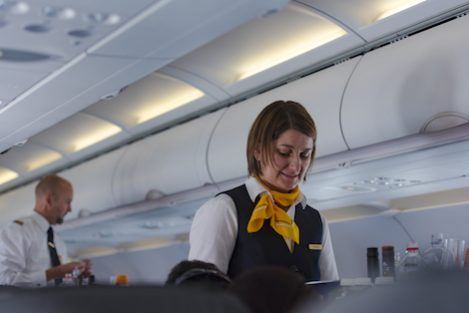For immediate release: June 25, 2018
Boston, MA – U.S. flight attendants have a higher prevalence of several forms of cancer, including breast cancer, uterine cancer, gastrointestinal cancer, thyroid cancer, and cervical cancer, when compared with the general public, according to new research from Harvard T.H. Chan School of Public Health. The study, one of the largest and most comprehensive analyses of cancer among cabin crew members conducted to date, is the first to show that flight attendants in the U.S. also have a higher rate of non-melanoma skin cancer than the general population.
“Our findings of higher rates of several cancers among flight attendants is striking given the low rates of overweight and smoking in our study population, which highlights the question of what can be done to minimize the adverse exposures and cancers common among cabin crew,” said Irina Mordukhovich, a research fellow at Harvard Chan School and the corresponding author of the paper.
The study was published online in Environmental Health on June 25, 2018.
Over the course of their careers, flight attendants are regularly exposed to several known and probable carcinogens, including cosmic ionizing radiation, disrupted sleep cycles and circadian rhythms, and possible chemical contaminants in the airplane. Moreover, cabin crews are exposed to the largest effective annual ionizing radiation dose relative to all other U.S. radiation workers because of both their exposure to and lack of protection from cosmic radiation. Despite these known risks, flight attendants have historically been excluded from Occupational Safety and Health Administration protections typically granted to U.S. workers. Limited protections were instituted in 2014, but they don’t include monitoring or regulating radiation exposure.
The researchers began studying flight attendants’ health more than a decade ago, when they launched the Harvard Flight Attendant Health Study (FAHS). The new findings are based on a 2014-2015 survey of 5,366 U.S. flight attendants in which they were asked about self-reported health outcomes and symptoms, work experience, personal characteristics, and aviation employment history. The researchers compared the prevalence of cancers among the surveyed flight attendants with similar information from the National Health and Nutrition Examination Survey, an annual survey of approximately 5,000 U.S. residents that is conducted by the U.S. Centers for Disease Control and Prevention.
The results showed that flight attendants had a higher prevalence of every cancer that was examined, especially breast cancer, melanoma, and non-melanoma skin cancer among females, confirming multiple U.S. and European studies. Job tenure was linked to non-melanoma skin cancer among females, with borderline associations for melanoma and non-melanoma skin cancer among males.
The findings suggest that additional efforts should be made in the U.S. to minimize the risk of cancer among flight attendants, including monitoring radiation dose and organizing schedules to minimize radiation exposure and circadian rhythm disruption, say the authors.
“The E.U. already evaluates radiation exposure among flight attendants, which our findings show may be an important step toward lowering cancer risk among this work population,” said Eileen McNeely, director of Harvard SHINE.
Other Harvard Chan School study authors included Steven Staffa, Samuel Tideman, Sara Gale, and Brent Coull.
Funding for the study came from Flight Attendant Medical Research Institute grant CIA 150083.
“Cancer prevalence among flight attendants compared to the general population,” Eileen McNeely, Irina Mordukhovich, Steven Staffa, Samuel Tideman, Sara Gale, Brent Coull, Environmental Health, online June 25, 2018, doi: 10.1186/s12940-018-0396-8
Visit the Harvard Chan School website for the latest news, press releases, and multimedia offerings.
For more information:
Chris Sweeney
617.432.8416
csweeney@hsph.harvard.edu
image: iStock.com
###
Harvard T.H. Chan School of Public Health brings together dedicated experts from many disciplines to educate new generations of global health leaders and produce powerful ideas that improve the lives and health of people everywhere. As a community of leading scientists, educators, and students, we work together to take innovative ideas from the laboratory to people’s lives—not only making scientific breakthroughs, but also working to change individual behaviors, public policies, and health care practices. Each year, more than 400 faculty members at Harvard Chan School teach 1,000-plus full-time students from around the world and train thousands more through online and executive education courses. Founded in 1913 as the Harvard-MIT School of Health Officers, the School is recognized as America’s oldest professional training program in public health.
